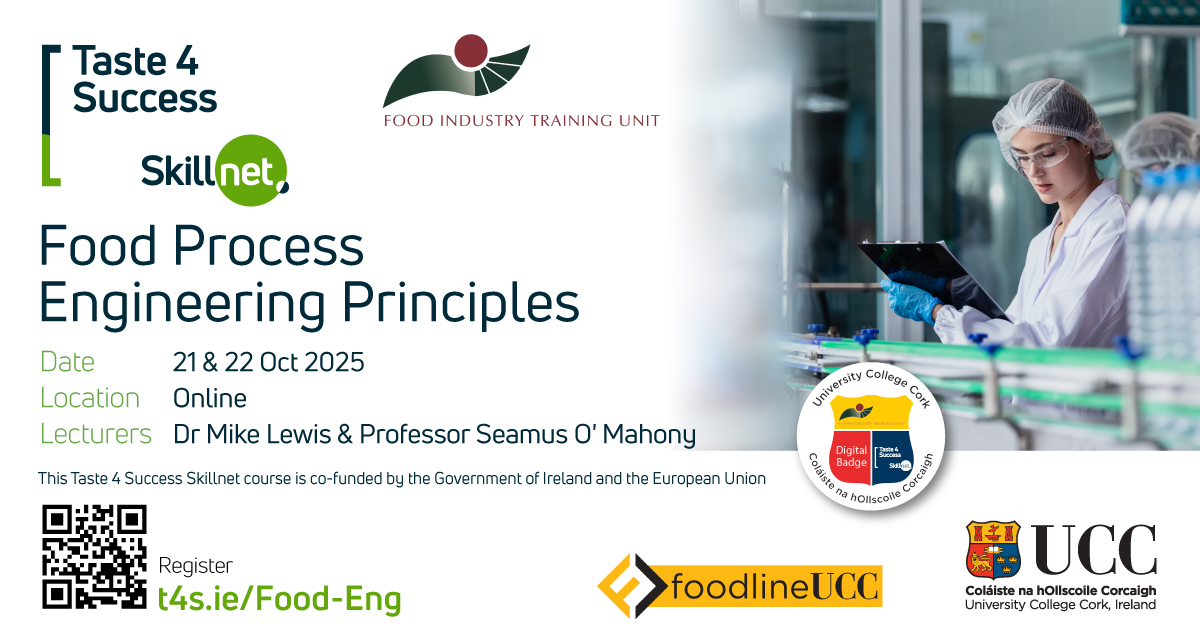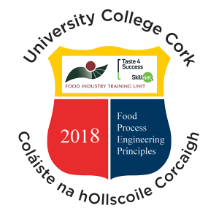
The next course will take place over 2 days online on 21 and 22 October 2025.
INTRODUCTION:
A working knowledge of engineering principles is invaluable in the design and optimization of food processes, yet this topic is increasingly now receiving less attention on food science degree programmes. To address this growing knowledge gap we provide this engaging and lively Food Engineering workshop. The workshop is presented by experts with vast experience in the application of engineering tools to solve relevant problems in the food industry.
The engineering principles covered in the programme, in topics such as fluid characteristics, concentration processes and powder handling, can be applied to troubleshoot a broad range of commercial food products and ingredients. These workshops are unique in that they combine both theoretical and practical learning. Knowledge exchange is effectively facilitated by focusing on small, interactive groups that allow for lively interactions. You will find this intimate and encouraging learning environment an ideal forum for updating or refreshing your knowledge and networking with experts from both industry and academia.
About this course
Who should attend?
Those responsible for designing, optimising and managing the processing of food products that are safe, high quality and innovative. This includes:
- Technical, quality and marketing managers
- Production staff and plant operators
- Quality assurance personnel
- Product developers and R&D personnel
- Food retailers
- Those wishing to interact with experts in their field
Participants will benefit from:
- Knowledge-exchange with leading academic and industry practitioners
- Perspectives gleaned from operations in the UK and overseas
- Gaining a solid grasp of food process engineering principles
Course programme
- Introduction, engineering units and mass balances
- The physics of process fluids
- Rheological analysis of food
- Principles of heat transfer
- Thermal process analysis
- Evaporation, membrane and drying technology
- Powder flow and dissolution science
- Food engineering tools of the future
This Workshop will:
- Improve your confidence dealing with engineering problems and calculations
- Aid you in performing heat and mass balances on your processes
- Teach you the effects of heat on microbial inactivation, enzymes and chemical reactions, with reference to D and z values and process evaluation for p*, F0 , B* and C* values
- Improve your understanding of the principles of concentration, fractionation and drying processes
- Give you the ability to incorporate concepts from rheology to support efforts at process analysis
- Update you on the latest science in powder flowability and dissolution
- Provide you with information on useful engineering concepts, including streamline and turbulent flow, fouling, residence times and distributions, steam properties and energy conservation
- Give you an expert overview of safety and quality issues, units and dimensions and methods of measurement
- Increase your awareness of the latest advances and future possibilities in engineering-based approaches to food process design
Trainers
Dr Mike Lewis is the Lead Workshop Trainer.
Mike Lewis worked for over 38 years at the University of Reading as a Lecturer and Senior Lecturer in the School of Chemistry, Food and Pharmacy before retiring 1n 2011. Mike was educated at the University of Birmingham in the Department of Chemical Engineering where he gained a BSc, MSc (Biol Eng) and PhD. Over the last 50 years, he has acquired considerable expertise in many topics related to food science and technology, including physical properties of foods, food processing operations, milk and milk processing, heat treatment, evaporation, drying and membrane technology. He has an excellent publication record in these areas, with over 90 refereed papers, over 25 book chapters and five published books. He was actively involved in maintaining the University pilot plant, which earned several million pounds in research and development income. He has supervised 35 PhD students and over 150 BSc and MSc project students. In later years, his research has focused on minerals in milk and their interactions with proteins, especially with regard to calcium and also magnesium and their role in casein micelle stability. Stability aspects studied include ethanol stability, heat coagulation, sediment formation, comparing heat stability to in-container sterilization with UHT sterilization, fouling of heat exchangers and fouling of UF membranes. His most recent work involved developing procedures for measuring pH and ionic calcium at high temperatures, to better understand their role in heat stability of milk and the effects of chelating agents on these parameters related to calcium fortification, calcium removal and stabilizer addition. Since leaving the University in 2011, he has focussed on providing workshops, trouble shooting and problem solving. He has worked with companies all over the world and now offers both face-to-face and on-line consultations and workshops. His most recent interests are food process engineering aspects of environmental issues, such as water, energy and waste reductions.
Dr Seamus (James) A O’Mahony is a Lecturer in Food Science at University College, Cork. He graduated from UCC with a BSc in Food Science and a PhD in Food Science and Technology in 2001 and 2005, respectively. He conducted part of his PhD studies at the University of Wisconsin-Madison, USA in the area of milk protein ingredient development using membrane filtration technology. On completing his PhD, he was awarded a Government of Ireland postdoctoral researcher position at the Teagasc Food Research Centre, Moorepark. Seamus also worked in a number of industrial research and development positions for 5 years with Wyeth and Pfizer Nutrition. He currently has a large research group (20 PhD and MSc students and postdoctoral researchers) focused on food ingredients research. He has published over 50 peer-reviewed scientific papers, 12 book chapters and edited or co-authored 2 books over the last 10 years.
Digital Badge Award
Upon successful completion,  you will be awarded a digital badge which can be used to support your CV and e-portfolio. A digital badge is an award which recognises your accomplishment in completing an unaccredited course and is referred to as a micro-credential. By taking part in the in-course activities and successfully completing the in-course questions you will qualify for a digital badge in Food Process Engineering Principles. The badge can be downloaded and included on CVs, shared via email or included on your e-portfolio (for example on LinkedIn). When a person or employer clicks on your digital badge they will see the specific details of the course, the process by which the course was given and if the course was successfully completed. Digital badges can be used to illustrate continued professional development and can supplement existing qualifications.
you will be awarded a digital badge which can be used to support your CV and e-portfolio. A digital badge is an award which recognises your accomplishment in completing an unaccredited course and is referred to as a micro-credential. By taking part in the in-course activities and successfully completing the in-course questions you will qualify for a digital badge in Food Process Engineering Principles. The badge can be downloaded and included on CVs, shared via email or included on your e-portfolio (for example on LinkedIn). When a person or employer clicks on your digital badge they will see the specific details of the course, the process by which the course was given and if the course was successfully completed. Digital badges can be used to illustrate continued professional development and can supplement existing qualifications.
Register
The cost of this course is €450 per participant- partial funding may be available for eligible participants.
Click here to register for this course
For further information contact:
Rachel Delaney
Programme Manager
Food Industry Training Unit
School of Food and Nutritional Sciences College of Science,
Engineering and Food Science,
University College Cork
email: rachel.delaney@ucc.ie
Other relevant courses
Other courses which may be of interest to you are:
- Food Safety and Quality Audits - A Practical Approach
- Thermal Processing
- Ice-Cream Science and Technology
- Cheese Science and Technology
